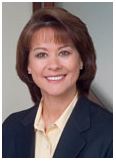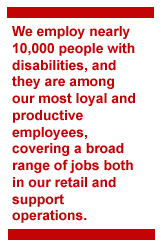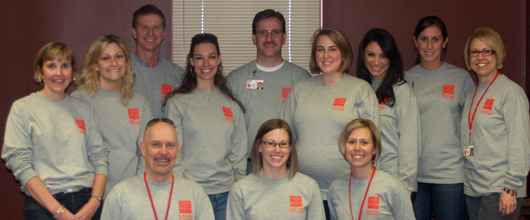People with disabilities: underutilized resources
by Laree Renda
 Editor’s note: Laree Renda is Executive Vice President, Chief Strategist and Administrative Officer for Safeway Inc. Every year, Safeway devotes the month of April to raising money for Easter Seals in a coordinated company-wide fund raising drive. Laree’s blog post originally ran in The Contra Costa Times, a newspaper in the San Francisco Bay Area.
Editor’s note: Laree Renda is Executive Vice President, Chief Strategist and Administrative Officer for Safeway Inc. Every year, Safeway devotes the month of April to raising money for Easter Seals in a coordinated company-wide fund raising drive. Laree’s blog post originally ran in The Contra Costa Times, a newspaper in the San Francisco Bay Area.
This year marks the 20th anniversary of the landmark Americans with Disabilities Act (ADA) that gave millions of previously forgotten citizens the legal right to more fully participate in American life — including employment.
For decades, people with disabilities were commonly institutionalized or “warehoused.” A small minority were afforded limited opportunity for employment in sheltered or isolated workplaces doing menial tasks often for less than the minimum wage.
Like the civil rights legislation in the 1960s that served as its foundation, ADA created some immediate and important change. The act literally reconfigured public space and redefined accessibility by breaking down physical and institutional barriers. The new law afforded this same demographic a broader range of opportunities to more fully exercise their constitutional rights. More specifically, ADA prompted employers to reconsider their definition of disability and proactively seek employment opportunities for this part of the population.
During the month of April, Safeway will conduct its annual disabilities fundraising campaign benefiting Easter Seals, Special Olympics and a range of other smaller organizations dedicated to assisting people with disabilities.
 Safeway is committed to raising awareness and encouraging other employers to tap this vast talent pool all too commonly known as the “disabled.” As our nation regains its economic footing and we celebrate the anniversary of ADA, it is worth remembering that economic recovery should, at its core, include all segments of the population — that along with a paycheck, gainful employment affords a priceless measure of self worth.
Safeway is committed to raising awareness and encouraging other employers to tap this vast talent pool all too commonly known as the “disabled.” As our nation regains its economic footing and we celebrate the anniversary of ADA, it is worth remembering that economic recovery should, at its core, include all segments of the population — that along with a paycheck, gainful employment affords a priceless measure of self worth.
While our nation has made progress, data on employment tells us that our nation is falling short of the spirit and intent of the ADA. In fact, people with disabilities remain on the outskirts of the workplace. According to the U.S. Department of Labor, of the some 27 million civilian, non-institutionalized Americans 16 years or older with a disability, approximately 80 percent are not even present in the workforce.
According to Richard Horne, director of Policy Planning and Research at the U.S. Department of Labor’s Office of Disability Employment, the percentage of people with a disability who are unemployed today has not significantly improved in the past two decades.
He says that while we are “eons beyond where we were in the 1970s and 1980s and opportunities are more plentiful, there’s still a long way to go.” Horne sees greater willingness among employers to hire people with disabilities; however, the vast job gap remains a barrier to any measure of success to the jobs provision of ADA.
In our view the key is two fold: first, employers must understand that physical or intellectual disability does not predict poor employability or productivity.
In fact, our experience proves the opposite. We employ nearly 10,000 people with disabilities, and they are among our most loyal and productive employees, covering a broad range of jobs both in our retail and support operations.
For instance, we have developed creative workplace solutions for visual and hearing-impaired clerks working in our retail stores.
Next, employers should understand they are not required to fly solo when employing people with disabilities. There are a host of national and regional organizations focused on training and placing people with disabilities in the workplace.
Easter Seals, The ARC, Stepping Stones, Clausen House, Jewish Vocational Services and other like-minded organizations are actively working to ensure that employers have resources to ensure employees with disabilities are successful creating a true win-win situation.
Many of these organizations provide on-site staffing to coach both the employee and employer on how to acclimate and accommodate people with disabilities.
Employers can utilize third-party coaches who shadow employees during their early days on the job. The process has created benefits well beyond providing a job. Through our experience we have gained unique and unexpected insights into the real value of mentoring and training.
As many American’s suffer through the most profound and sustained economic downturn of a generation, we would simply ask readers to consider this — the financial uncertainty and anxiety that many among us are experiencing for the first time remains a chronic and frustrating state of being for millions of people with disabilities seeking employment.
Easter Seals CEO James E. Williams Jr. recently expressed a profound sentiment that echoes our experience and that of other American companies that have chosen to hire and develop people with disabilities. He said that “people with disabilities make an enormous contribution to America on so many levels. Meaningful employment remains the best way for people with disabilities to be free from the centuries-old cycle of poverty, social isolation and marginalization.”








 The
The  The festivities featured many personalities from the Wolves, former players Bob Nardella, Steve Martins and Skates, the team mascot. Students assisted the players on cutting the ribbon to officially open the library. Then they were entertained with the players reading wonderful stories of books from the library. The Chicago Wolves School Library is a huge success and will be an essential learning tool for the students at the Therapeutic School.
The festivities featured many personalities from the Wolves, former players Bob Nardella, Steve Martins and Skates, the team mascot. Students assisted the players on cutting the ribbon to officially open the library. Then they were entertained with the players reading wonderful stories of books from the library. The Chicago Wolves School Library is a huge success and will be an essential learning tool for the students at the Therapeutic School. While working in Hawaii I had the chance to provide support to many families who were in the military. The needs of these families were similar to any other family living with autism — things like teaching their child social skills and supporting their children to become as independent as possible.
While working in Hawaii I had the chance to provide support to many families who were in the military. The needs of these families were similar to any other family living with autism — things like teaching their child social skills and supporting their children to become as independent as possible.